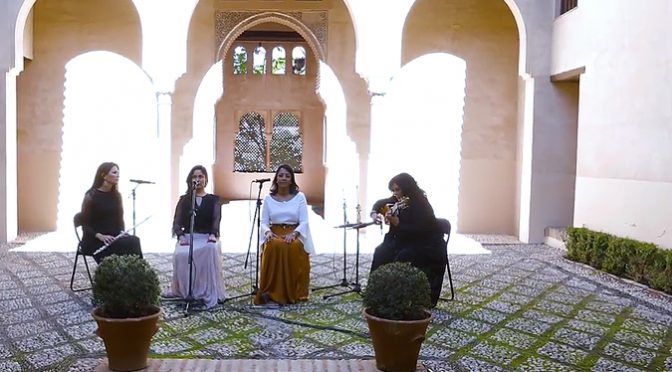Mujeres Mediterráneas (Mediterranean Women) is an all-female ensemble based in Granada (Spain) featuring artists from various backgrounds, who combine Flamenco and Arabic music. World Music Central interviewed this rising act.

How did the Mujeres Mediterráneas project come about?
Mujeres Mediterráneas is a musical ensemble based on the coexistence of music and cultures, specifically between Flamenco and Arabic Music. It was created in 2015 as a result of the vital encounter of our music on stage. The project arose from a musical encounter where Arab singer Habiba Chaouf coincided with flamenco guitarist Pilar Alonso; a musical and cultural exchange was created that grew and resulted in the current quartet incorporating flutist, Mixtlan Salomón and the then little known flamenco cantaora (singer), Ana Sola.
In the musical universe of Mediterranean women, Middle Eastern and Andalusian rhythms are interwoven between harmonies, flamenco songs, Arabic songs and Sephardic melodies. Thus, they discover and experience a personal musical language that dialogues between East and West in a free and playful way. Enjoying the musicality and diversity of the languages (Berber, Classical Arabic, French Dariya and Spanish). Between the “pinches” of the flamenco guitar, the melodies of the flute, the rhythmic variations of the bendir and flamenco palmas (handclap percussion), the Arabic and flamenco voices move between Morocco, the East and Spain, transporting us to a trip throughout the Mediterranean, remembering the essence that each culture entails.
How did the four members of the group meet?
Habiba and Pilar coincided in a fusion show. This meeting generated a friendship relationship by sharing the customs of their cultures in essays accompanied by the gastronomy of both countries. In each rehearsal the music was present in a natural way and likewise mixed, like a stew that requires different ingredients. The Arabic voice feels accompanied by the flamenco harmonies and rhythms and feels them as their own and the guitar is recreated in the Arabic melismas as “quejíos” (flamenco moans).
Mixtlan, recently arrived from Argentina, with much knowledge of flamenco and Arabic music, joined the group with flamenco singing sung with the flute in what we call the “flautaora”.
Ana, one of the most important cantaoras of her generation, joined later, providing with her vocal strength and her stylistic versatility a very personal vision of the flamenco side.

What are the essential elements of your music?
We work with “the dialogue between the Arabic voice of Habiba and the flamenco voice of Ana” with the accompaniment of Pilar’s guitar and Mixtlan’s flute, along with the instrumental songs of the “flute” and the falsetas of the “tocaora” (guitar player). All this is completed with the rhythms of the bendir performed by Habiba and the flamenco palmas of Ana.
Who can be cited as the main musical influences of the group?
We are inspired by classical Arabic music and poetry and flamenco in general, giving our “personal touch”. Each of us carries a “backpack” of musical knowledge that, when put together, generates a particular sound.
What musical instruments do you use?
Flamenco guitar, Pilar Alonso.
Flamenco flute, Mixtlan Solomon.
Arabic bendir Arab, Habiba Chaouf.
Flamenco palmas, Ana Sola.
What has been the reaction of the public so far?
The public surprises us with their reaction every time we get on the stage. We are grateful for the coexistence of cultures and the naturalness that characterizes us when we present ourselves in public. We also see that they enjoy female complicity that is not frequent in the current music scene.
How’s the flamenco scene in your area?
Flamenco is very healthy in Granada. Since it was named a World Heritage genre, it is cared for and more powerful. Flamenco reaches every corner of the world and that makes it possible to mix with all cultures, being a very open music.
Have you recorded any albums?
We are currently in the process of recording.
Much of what is broadcast on the radio, internet and movies is pop and hip hop. How do you divulge your music?
We currently do it with music videos on Youtube and our live performances.
Is there any effort on your part to raise awareness of flamenco and the music of the Maghreb?
Both Maghreb and Flamenco music are world-renowned, we take care of making them live together naturally, from the enjoyment of musical diversity and the complicity of common aspects from where they meet.
We like to share our music with all kinds of audiences including children that provides us their natural vision of mixing, from innocence without prejudice.
If you could gather musicians or musical groups to collaborate, who would you call?
We are open to collaborations from both the Flamenco world and the Arab world, as long as their music flows with our style.
Are you preparing any new projects
We are preparing the recording of our first album and a new show which shows the linguistic relationship between Arabic and Flamenco.
Author: Angel Romero
Angel Romero y Ruiz has dedicated his life to musical exploration. His efforts included the creation of two online portals, worldmusiccentral.org and musicasdelmundo.com. In addition, Angel is the co-founder of the Transglobal World Music Chart, a panel of world music DJs and writers that celebrates global sounds. Furthermore, he delved into the record business, producing world music studio albums and compilations. His works have appeared on Alula Records, Ellipsis Arts, Indígena Records and Music of the World.


